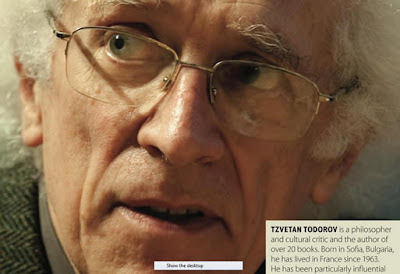Crabsallover Summary: The philosopher Tzvetan Todorov was born in Bulgaria and lives in France. His new book "The Defence of the Enlightenment", is a very difficult read, but this podcast with Nigel Warburton of Philosophy Bites is an easy summary of his ideas. The core ideas of the The Enlightenment were:
- Autonomy
- Humanity
- Universiality
- Criticism
- The Enlightenment (TE) was the period (17/18th century) during which modern identity was forged
- TE arose in several European countries
- TE is idea of Autonomy
- we decide as humans, 'within a certain sphere', what action to take.
- but individual has to protect himself from the invasion of the collective will
- Autonomy includes the collective body of society (The State) - The Sovereignty of The People
- Almost none of TE ideas was born in age of Enlightenment - it was a new combination - most TE ideas date back to ancient Greeks etc
- in that period TE integration into social life eg French Revolution / America Indepandance.
- Christianity dominated European society between period of ancient greeks and 18th century.
- Autonomy gave
- freedom of: knowledge
- did not have to submit to religion authority
- freedom of The Arts
- no need to sing praise of kings or nobles or to illustrate religion
- Humanity is the final goal of human action
- St Augustine 4th - only action, to enjoy for itself, was worshipping God
- TE - human beings are the final goal - the 'saving' of humanity was not the aim - it was the happiness of humanity which was now the goal
- legacy of Renaissance Humanism
- civil law was changed so that religious sins were not punished - only crimes of society were punished
- Universality
- Natural Right Theory - 1) general universal rules AND 2) plurality of cultures eg Montesquieu wrote 'The Spirit of Laws'
- Defence of TE
- Enemies of TE: TS Elliot, The Pope - John Paul 11, Aleksandr Solzhenitsyn
- believed that without a transcendent basis, human societies were condemned to endless war and no values could be defended
- contemporary enemies are theocracies and fundamentalist states (mostly islam) but also sects of christians and jews and other religious fanatics
- Contemporary critics say TE was the parent of:-
- Colonialism - TE was justification - but just a facade - not just enlightening distant people - but showing power & pride of country ['macho' behaviour]
- Communism - totalitarian empires - was suppression of personal freedom and elimination of bourgeois society so that 'equality' could be established
- cf TE did give us individual freedom, universality, equality of members of society
- Modernity (reason) has given nuclear bombs, The Holocaust - not a product of TE
- TE shares only some features, not all, of modernity
- today we aspire to emancipation, progress, freedom, equality, universiality.
- Optimistic ideas are not necessarily a product of TE (eg Rousseau) - destruction of nature and human society. Also David Hume, Immanuel Kant - balance between care for common good and individual interest
- 'Work more to gain more' is anti TE (ideal of French president)
- Criticism - is spirit of TE - open criticism and debate
- Are we winning the battle for The Enlightenment? I'm not sure.




No comments:
Post a Comment